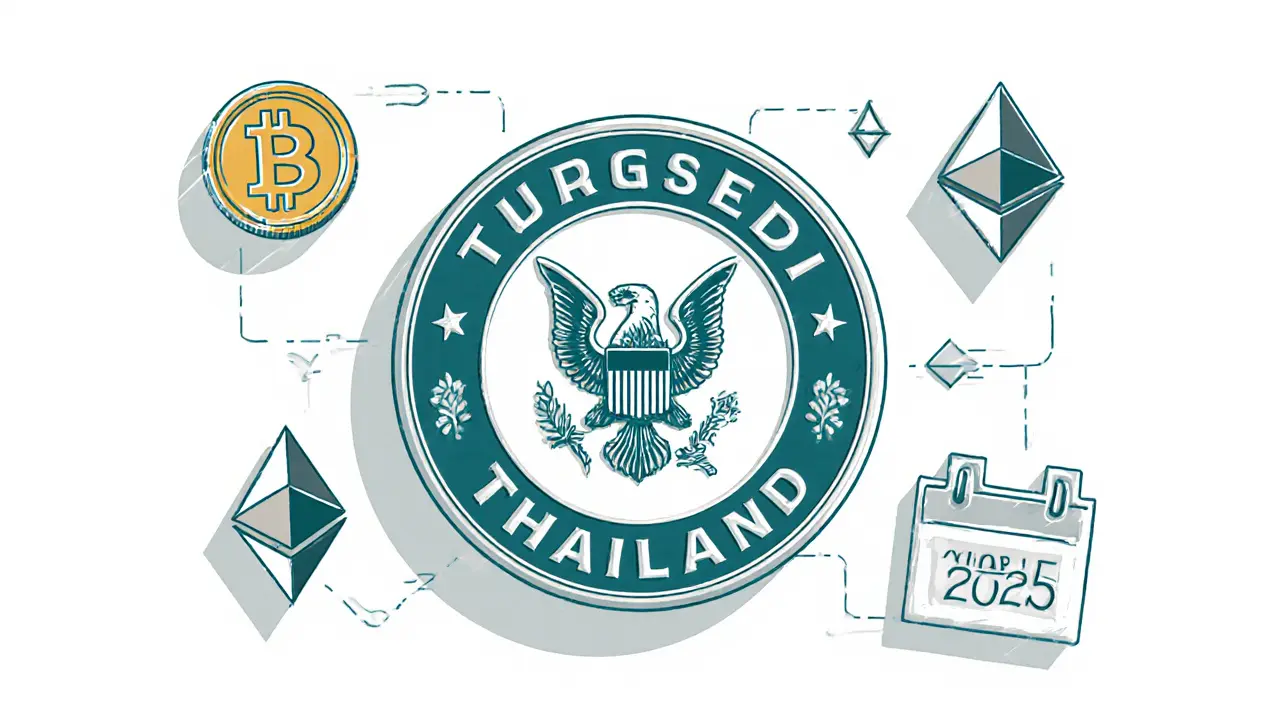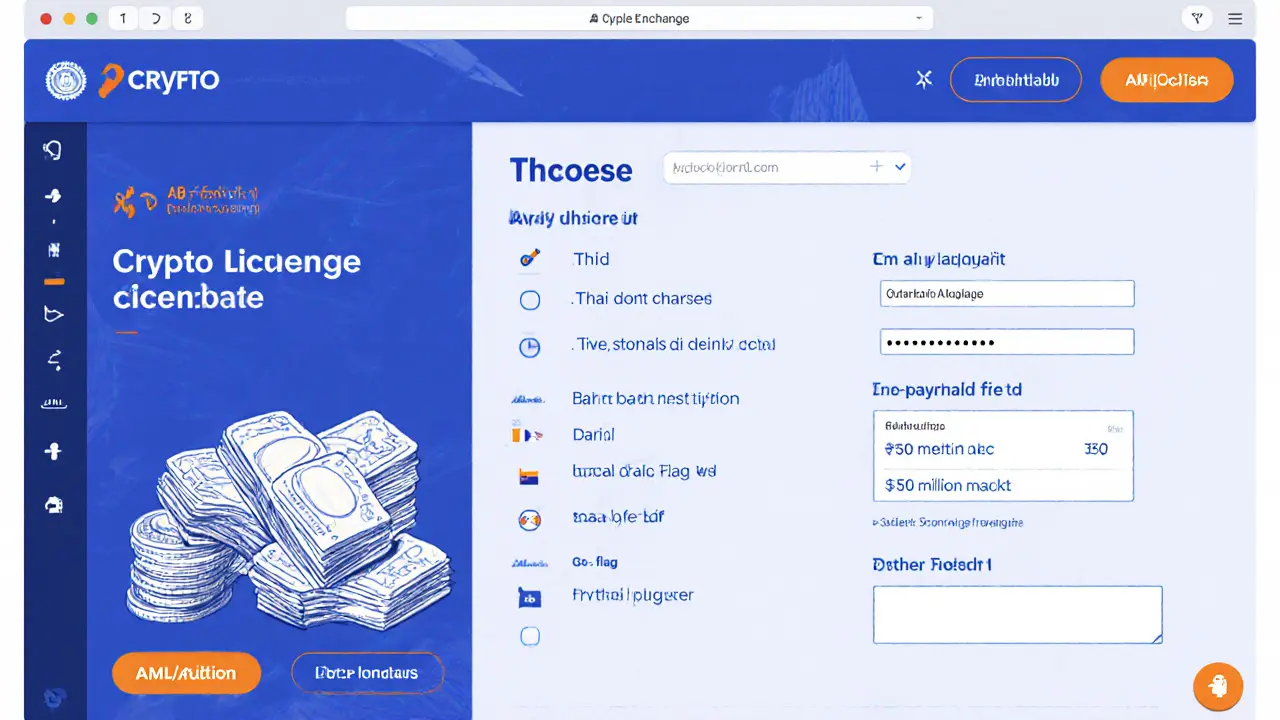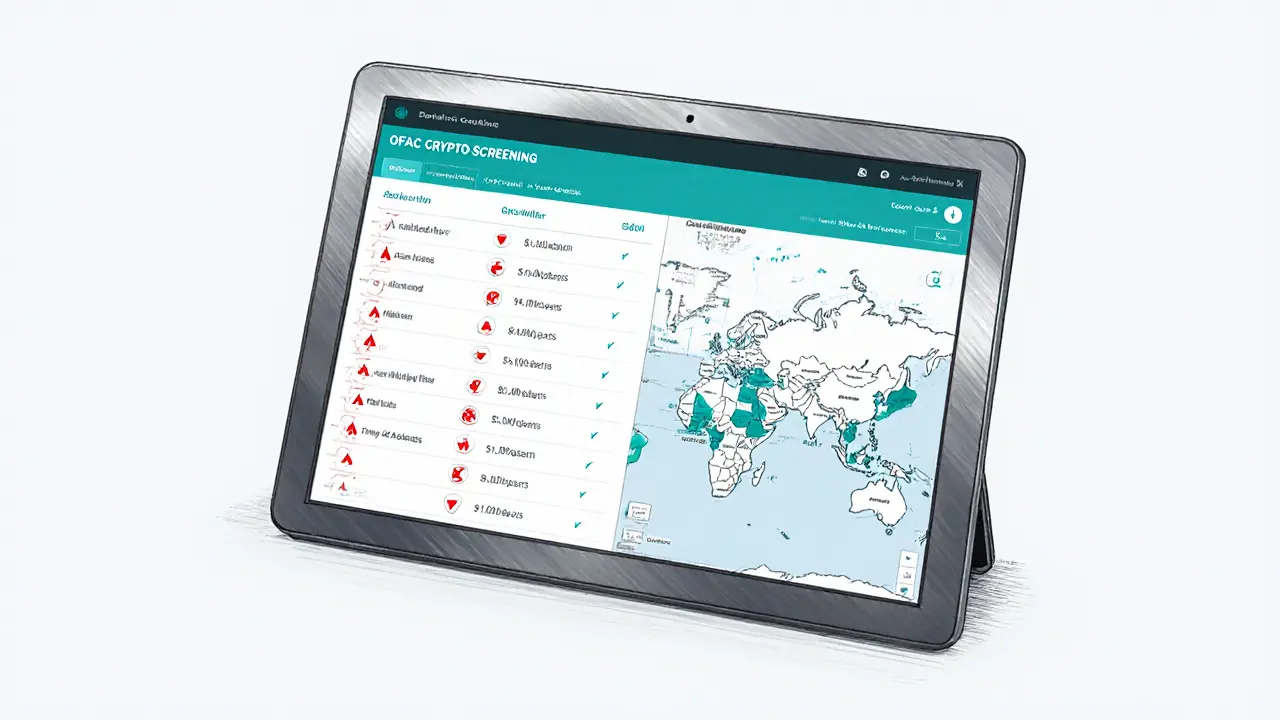Thailand SEC Crypto Exchange Regulations 2025: What You Need to Know

Thailand SEC Crypto Regulation Checker
This tool helps determine if your crypto platform needs a license under Thailand's 2025 SEC regulations. Check each criterion that applies to your platform.
1. Thai Language Content
Does your platform content appear in Thai language?
2. Domain Extension
Does your domain end with .th or .ไทย or include Thailand-related names?
3. Payment Methods
Do you accept payments in Thai baht or via Thai e-money accounts?
4. Dispute Resolution
Do Thai law or Thai courts govern disputes?
5. Search Engine Targeting
Do you pay search-engine fees to target Thai traffic?
6. Local Support
Do you have local offices or staff supporting Thai users?
7. Other Characteristics
Does your platform meet any other characteristics listed in SEC Notification No. TorJor.12/Aor.123/2568?
As of April 2025 the Thailand Securities and Exchange Commission (SEC) is the regulator that enforces the country’s crypto rules and anyone wanting to run a digital‑asset platform for Thai users must line up with its latest mandates. The Thailand SEC crypto regulations are reshaping who can trade, which tokens are allowed, and how much freedom foreign exchanges have. Below you’ll find a step‑by‑step guide that takes the mystery out of the new framework.
Why the SEC stepped in
In early 2025 a wave of crypto‑related scams hit Thai investors. The Royal Thai Police’s Cybercrime Investigation Division logged a 37% rise in fraud reports between Q1 and Q2. In response, the Ministry of Finance, working through the Digital Asset Business Act originally passed in 2018 and amended in 2025, gave the SEC sweeping powers to protect consumers and align Thailand with FATF anti‑money‑laundering standards.
Key parts of the 2025 amendment
The April 13, 2025 emergency decree added seven concrete tests that decide whether a foreign platform is “serving Thai users.” If any of the following applies, the platform must obtain a Thai licence:
- Content appears in Thai language.
- Domain ends with ".th" or ".ไทย" or includes a Thailand‑related name.
- Payments are accepted in Thai baht or via Thai e‑money accounts.
- Thai law or Thai courts are named for dispute resolution.
- Search‑engine fees target Thai traffic.
- Local offices or staff support Thai users.
- Any other characteristic listed in SEC Notification No. TorJor.12/Aor.123/2568.
Meeting these triggers forces even giants like Bybit a foreign peer‑to‑peer crypto exchange and OKX another overseas exchange to halt operations in Thailand unless they secure a licence.

How exchanges get licensed
Getting a licence is a multi‑step process. Below is the typical timeline and required documentation:
- Application window: 30 days from the moment the platform targets Thai users.
- Fees: ฿1,000,000 (~$27,400) one‑time, plus ฿500,000 (~$13,700) annual.
- Capital requirement: Minimum ฿50 million (~$1.37million).
- AML/CFT systems: Must meet FATF standards and be certified by an SEC‑approved auditor.
- Source‑code audit: Full code review by a recognised security firm.
- Localisation: UI/UX must be available in Thai and any Thai‑specific legal clauses added.
The average approval period is 90‑120days, based on the nine licences granted by February 2025. Bitkub Exchange Thailand’s largest licensed digital‑asset portal reported a six‑month implementation cycle before full compliance.
What’s allowed and what’s banned
Once licensed, an exchange can list only assets approved by the SEC. As of June 2025 the list includes Bitcoin, Ethereum, and a handful of other tokens (about 35 in total). The following are explicitly prohibited:
- Privacy‑focused coins (e.g., Monero, Zcash).
- Meme tokens and fan tokens.
- Any NFT sales on the exchange platform.
- Advertising, wallet services, or facilitating crypto payments for goods.
- Deposit‑taking or lending schemes promising fixed returns.
Staking services received a clarifying notice on June12025: only SEC‑approved staking products are permitted, and they must be offered with clear risk disclosures.
Impact on local and foreign platforms
The regulatory shift has reshaped market share. Domestic licensed platforms grew from 15% of total trading volume in Q42024 to roughly 78% by Q22025. Foreign exchanges that failed to obtain a licence were blocked overnight via the Ministry of Digital Economy and Society’s rapid‑block mechanism.
Trader sentiment reflects a trade‑off:
- +Security: 87% of positive comments on Pantip cite reduced scams.
- -Liquidity: Users report wider spreads and higher fees (0.25% vs 0.10% on former foreign platforms).
- -Choice: Only 35 tokens versus 350+ on global exchanges.
Nonetheless, the National Blockchain Policy Office the government agency driving blockchain projects has earmarked ฿2.1billion through 2027 for innovation, suggesting the crackdown is meant to weed out bad actors while still nurturing growth.
Practical checklist for crypto businesses
If you’re a startup or an established exchange eyeing Thailand, run through this list before you submit your licence application:
- Confirm whether any of the seven “service to Thai users” criteria apply.
- Translate the entire user interface into Thai and add the required legal disclaimer.
- Set up a Thai corporate entity or at least a local representative office.
- Secure AML/CFT software that can generate real‑time transaction reports in Thai.
- Prepare a capital proof document showing ฿50million in liquid assets.
- Obtain a source‑code audit report from an SEC‑approved firm.
- Pay the application and annual fees via a Thai bank account.
- Draft a dispute‑resolution clause that names Thai courts as the venue.
Missing any of these steps typically leads to a denied licence or a forced shutdown within 30days of enforcement.
Common pitfalls and compliance tips
Even seasoned operators slip up. Here are the most frequent mistakes and how to avoid them:
- Using a .com domain with Thai language content. The SEC treats this as a “service” trigger. Switch to a .th domain or obtain an exemption.
- Accepting Thai‑baht deposits through third‑party wallets. Only SEC‑approved e‑money accounts are allowed.
- Advertising on Thai‑focused social media. Any paid ad that targets Thai users counts as marketing; you must have a licence first.
- Offering unapproved tokens. Double‑check the SEC’s token whitelist before adding a new pair.
- Neglecting ongoing audits. The SEC conducts random compliance checks; keep all AML logs for at least five years.
Sticking to these guidelines will keep your operation on the right side of the law and let you focus on building a trustworthy product.
Frequently Asked Questions
Do I need a Thai licence if my exchange only accepts BTC and ETH?
Yes. The Digital Asset Business Act covers all cryptocurrencies, not just tokens. If your platform targets Thai users in any of the seven ways, you must be licensed, even for just Bitcoin and Ethereum.
Can a foreign exchange operate in Thailand through a VPN?
Technically users can access foreign sites via VPN, but the SEC still considers the platform to be serving Thai users if any of the seven criteria are met. The Ministry can block the site, and the exchange could face penalties for unlicensed activity.
What is the average cost to become a licensed exchange?
Beyond the application fee of ฿1million and annual fee of ฿500thousand, you’ll need at least ฿50million in capital, AML software, a code audit and local staff. Total first‑year outlay often exceeds US$2million.
Are staking services allowed?
Only if the staking product is pre‑approved by the SEC. The June12025 clarification requires clear risk disclosures and prohibits guaranteed‑return promises.
How long does the licence approval take?
Historically 90‑120days, assuming you submit a complete dossier and meet the capital and AML requirements.


Hanna Regehr
October 10, 2025 AT 08:12If you’re gearing up to launch a crypto service aimed at Thai users, the first step is to run the SEC checklist and see if any of the seven triggers apply-content in Thai, a .th domain, baht payments, Thai‑law dispute clauses, Thai‑targeted ads, local staff, or any other listed characteristic. From there you’ll need to set up a Thai corporate entity, lock down at least ฿50 million in liquid capital, and line up an AML/CFT solution that can feed real‑time reports to the regulator. Don’t forget the source‑code audit by an SEC‑approved firm; that’s a non‑negotiable part of the dossier. Once your paperwork is solid, submit the application within 30 days of “targeting” Thai users and brace for a 90‑120 day review period. The fees are steep-roughly ฿1 million up‑front plus an annual ฿500 k-but they’re predictable, and paying them via a Thai bank account keeps the process smooth. Finally, make sure your UI is fully localized in Thai and that your terms of service name Thai courts for any disputes. Follow this roadmap and you’ll avoid the sudden shutdowns that have hit unlicensed foreign exchanges.
Ben Parker
October 10, 2025 AT 15:09Wow 😲 the SEC really went all‑in on crypto this year-no more flying under the radar! 🌐🚀
Daron Stenvold
October 10, 2025 AT 23:29Let us consider the broader implications of the Thai SEC's 2025 amendment in a structured manner. First, the regulatory tightening directly addresses the surge in fraud cases reported by the Royal Thai Police, which saw a 37 % increase in crypto‑related scams during the first half of the year. Second, by defining clear criteria-Thai language content, .th domains, baht payment acceptance, Thai‑law dispute resolution, targeted advertising, local presence, and any other enumerated characteristics-the SEC creates a predictable framework for compliance. Third, this framework forces foreign exchanges to either obtain a license or cease operations, thereby reducing the number of unregulated platforms serving Thai investors. Fourth, the licensing process, while costly, establishes a capital baseline of ฿50 million, which serves as a financial buffer against insolvency and market manipulation. Fifth, AML/CFT requirements aligned with FATF standards ensure that transaction monitoring meets international best practices, reducing the risk of money‑laundering. Sixth, the mandatory source‑code audit introduces a technical safeguard, allowing the regulator to verify that smart contracts and exchange infrastructure are free from critical vulnerabilities. Seventh, the requirement for UI localization not only improves consumer protection but also promotes financial inclusion by making the platform accessible to non‑English speakers. Eighth, the limitation on listed tokens to a whitelist of roughly 35 assets curtails exposure to speculative and high‑risk tokens, thereby protecting retail investors. Ninth, the prohibition of privacy‑focused coins, meme tokens, and unapproved NFTs addresses concerns about anonymity and regulatory evasion. Tenth, the ban on offering unlicensed staking products prevents the promise of guaranteed returns, a common scam vector. Eleventh, the data retention mandate of five years for AML logs equips the SEC with historical records essential for forensic investigations. Twelfth, the rapid‑block mechanism administered by the Ministry of Digital Economy ensures swift enforcement against non‑compliant platforms. Thirteenth, the overall market share shift-domestic licensed exchanges rising from 15 % to 78 % of trading volume within a year-demonstrates the efficacy of the policy in reshaping the ecosystem. Fourteenth, the increased fees and reduced liquidity reported by traders highlight the trade‑off between security and market efficiency. Finally, the National Blockchain Policy Office's allocation of ฿2.1 billion for innovation signals that the Thai government seeks to foster legitimate blockchain development while weeding out malicious actors. In sum, this regulatory overhaul is a decisive move toward a more secure and transparent crypto market in Thailand.
hrishchika Kumar
October 11, 2025 AT 05:02From a cultural standpoint, the SEC’s push for Thai‑language UI and local support signals respect for the Thai user base. It also helps bring crypto education into the native tongue, which can demystify the technology for many who were previously intimidated by English‑only platforms. This move could spark a wave of home‑grown fintech talent, as developers see a clear path for building compliant services. Moreover, the emphasis on local dispute resolution aligns with Thai legal traditions, giving users confidence that any issues will be addressed in a familiar court system. All in all, it’s a step toward integrating crypto into the everyday financial life of Thailand, not just a niche hobby.
Nina Hall
October 11, 2025 AT 11:59Great overview! The checklist is super helpful, and it’s encouraging to see the government actually backing legit projects while weeding out scammers. Looking forward to seeing new, compliant exchanges bring fresh innovation to the Thai market.
Lena Vega
October 11, 2025 AT 16:09Licensing is a must now.
Mureil Stueber
October 11, 2025 AT 21:09The capital requirement of ฿50 million can be daunting for startups, but it also filters out fly‑by‑night operators and ensures that only serious players enter the Thai market.
Emily Kondrk
October 12, 2025 AT 03:16Is anyone else wondering whether the SEC is quietly funneling crypto traffic to a handful of friendly domestic firms? The sudden ban on foreign exchanges feels a bit too coordinated, like there’s a hidden agenda to consolidate power.
Laura Myers
October 12, 2025 AT 08:49Honestly, this whole crackdown is like watching a drama unfold-one minute you’re trading on a fancy global exchange, the next you’re left staring at a ‘License Required’ error. It’s wild.
Leo McCloskey
October 12, 2025 AT 15:46All this regulatory over‑kill could stifle innovation; the high fees and token whitelist are just bureaucratic hurdles that will push traders toward offshore solutions, undermining the intended consumer protection.
Anjali Govind
October 12, 2025 AT 19:56It’s interesting how the new rules prioritize local language and presence; this could actually boost local fintech startups that can meet the criteria without the massive overhead of foreign giants.
Sanjay Lago
October 13, 2025 AT 00:06True, and with the government allocating billions for blockchain initiatives, we might see a surge in home‑grown platforms that are both compliant and innovative.
arnab nath
October 13, 2025 AT 04:16The conspiracy angle is tempting, but the SEC’s actions are rooted in concrete fraud data, not a secret plot.
Lady Celeste
October 13, 2025 AT 08:26While the regs aim to protect users, the abrupt blocking of foreign sites feels heavy-handed and could drive users to less regulated, riskier corners of the web.
Ethan Chambers
October 13, 2025 AT 12:36Exactly, the sudden loss of liquidity and choice might outweigh the security benefits for many traders.
gayle Smith
October 13, 2025 AT 16:46And don’t forget the impact on token diversity-only 35 assets are approved, which severely limits portfolio options.
Jon Asher
October 13, 2025 AT 20:56The enforcement timeline of 90‑120 days is pretty swift for regulatory processes; it forces companies to have all their ducks in a row quickly.
Scott Hall
October 14, 2025 AT 01:06Yep, the fast‑track encourages thorough preparation up front, which should reduce last‑minute scrambling.
Jade Hibbert
October 14, 2025 AT 05:16But the cost barrier-over $2 million total-might shut out promising innovators who lack deep pockets.
Leynda Jeane Erwin
October 14, 2025 AT 09:26True, the high entry cost could create an oligopoly of well‑funded players, limiting competition.
Brandon Salemi
October 14, 2025 AT 13:36The detailed checklist you provided, Daron, is a solid blueprint. I’d add that keeping detailed logs of every AML report will save a lot of headaches during the SEC’s random audits.
Siddharth Murugesan
October 14, 2025 AT 17:46Also, remember to back up all your source‑code audit reports in a secure, tamper‑proof archive-SEC inspectors love to see that.
Nathan Van Myall
October 14, 2025 AT 21:56Quick tip: if your domain ends with .com but you have Thai content, consider switching to a .th domain to avoid the license trigger.
debby martha
October 15, 2025 AT 02:06Good point. A simple domain change can save a lot of compliance hassle.
Ted Lucas
October 15, 2025 AT 06:16And don’t forget to update your DNS records and SSL certificates when you make the switch-technical details matter!
ചഞ്ചൽ അനസൂയ
October 15, 2025 AT 10:26Lastly, keep your local support team trained on both the regulatory requirements and the technical aspects; that hybrid expertise is crucial for ongoing compliance.